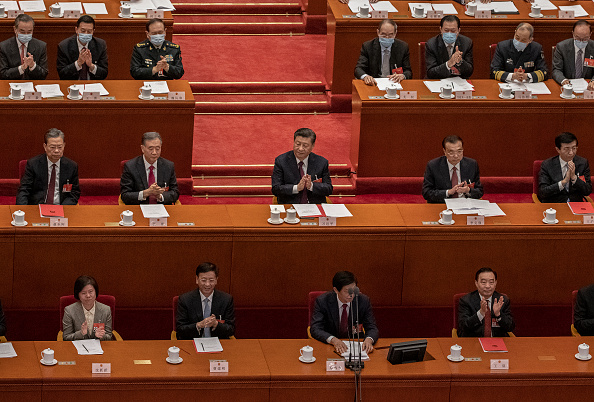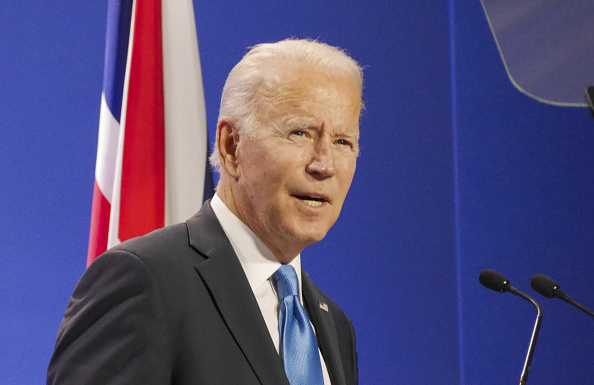
 A Historic Transformation
A Historic TransformationChinese President Xi Jinping delivered the first doctrine on Communist Party history in 40 years, setting him up for a near-inevitable third term that would extend his rule until at least 2027 and giving him the mandate to potentially rule for life. The two other leaders who have produced a resolution, Mao Zedong and Deng Xiaoping, dominated politics in China until their deaths.
At a closed-door plenary session of the Central Committee, senior Chinese Communist Party officials designated Xi a historic figure, praising his 'great political courage' and saying he has realized "historic achievements and historic changes." Although the resolution has yet to be released, the Central Committee called on the country to "unite around the party with Xi at the core," implement his doctrine to strive for party goals set through 2049 and realise "the great rejuvenation of the Chinese nation," the communique said, according to Xinhua.
Xinhua News posted on Twitter that Xi is "is a man of determination and action, a man of profound thoughts and feelings, a man who inherited a legacy but dares to innovate, a man who has forward-looking vision and is committed to working tirelessly."
At a high-level press conference the following day, Chinese officials voiced rare, public criticism of Western democracies that impose their ideas of democracy on the world, specifically China. "The electoral democracy of Western countries are actually democracy rules by the capital, and they are a game of the rich, not real democracy," said Jiang Jinquan, the director of the policy research office for the CCP.
Read more in, "The CCP Turns 100," by Tom Watkins, an Advisor at the Michigan-China Innovation Center.
 Managing the Competition
Managing the CompetitionDespite harsh rhetoric from both sides, President Joe Biden will meet virtually with Chinese President Xi Jinping on Monday evening, as the two countries showed some signs of progress this week on working together to address climate change despite continued divisions on other key issues such as Taiwan. The leaders have spoken on the phone since Biden took office, but Monday's meeting will be the first time they are engaging in a more formal bilateral meeting.
White House press secretary Jen Psaki said in a statement that "the two leaders will discuss ways to responsibly manage the competition between the United States and the PRC, as well as ways to work together where our interests align." She added that "President Biden will make clear U.S. intentions and priorities and be clear and candid about our concerns with the PRC."
According to a letter addressed to the National Committee on U.S.-China Relations, Chinese President Xi Jinping said the country is willing to work with the U.S. — on condition of mutual respect. "Both countries will gain from cooperation and lose from confrontation," Xi said in the letter. "Cooperation is the only right choice."
Ahead of the summit, the U.S. and China made a surprise announcement that they have agreed to cooperate on limiting emissions to address the global climate crisis. The world's top two greenhouse gas-emitting countries called for "concrete and pragmatic" regulations in decarbonization, reducing methane emissions and fighting deforestation, as well as ending coal power, the single biggest source of man-made greenhouse gas emissions.
 Tensions in the Strait
Tensions in the StraitAs cross-strait tensions between Beijing and Taiwan have risen over recent months, China's foreign ministry has once again urged the United States to cease official interaction with the island. The newest request from China comes after an unannounced visit to Taiwan by a U.S. congressional delegation earlier this week. Beijing emphasized that the visit violates the One China policy and stated that the U.S. must terminate all types of official interaction with Taiwan.
While China attempts to keep the U.S. an ocean's length away from its affairs with Taiwan, a recent increase in diplomatic activity indicates that some European nations seem to be moving closer in relations with the island after remaining uninvolved for years. Two weeks ago, a resolution calling for stronger ties with Taiwan was backed by the European Parliament, which described Taiwan as a "partner and democratic ally in the Indo-Pacific." The resolution came when Taiwan's foreign minister was in the EU on a charm offensive having informal, but unprecedented, meetings with lawmakers. And just last week, the first-ever formal delegation was sent to visit the island by the European Parliament, despite threats of retaliation from Beijing. But though there has been a significant increase in diplomatic engagement between Europe and Taiwan, Europe has not shown any indication of abandoning its recognition of Beijing's position or policy that there is only one Chinese government.
Read more in, "Beautiful Words, Dangerous Actions," by Wu Zurong, a Research Fellow at the China Foundation for International Studies.
Prepared by China-US Focus editorial teams in Hong Kong and New York, this weekly newsletter offers you snap shots of latest trends and developments emerging from China every week, while adding a dose of historical perspective.
- 2021-11-05 A Green Rivalry
- 2021-10-29 Dry Tinder
- 2021-10-22 A Diplomatic Burn
- 2021-10-15 Energy Crunch
- 2021-10-08 Stoking Tensions
- 2021-10-01 Great Power Coopetition
- 2021-09-24 Sign of Goodwill?
- 2021-09-17 State of Play
- 2021-09-10 The Last Word
- 2021-09-03 Heightened Frustrations
- 2021-08-27 China’s Backyard
- 2021-08-20 Graveyard of Empires
- 2021-08-13 A New Crossroads
- 2021-08-06 Lowering Barriers
- 2021-07-30 A Diplomatic Stalemate
- 2021-07-23 A Climate for Change
- 2021-07-16 The Trade Game
- 2021-07-09 Existential Threats
- 2021-07-01 Centenary Celebrations
- 2021-06-25 Critical Crossroads